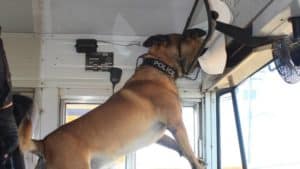Report from the Board of Police Commissioners doesn’t mention 2 bystanders who were bit

Regina police service dogs bit 24 suspects in 2017, says a report from the Board of Police Commissioners.
That means the dogs bit people about one in eight times when the handler and their dog made an arrest.
It’s a reduction over the previous three years, when the average was one in seven suspects being bitten.
2017 Regina Police Canine Unit use at a glance:
- 190 canine arrests made
- 24 suspects bitten
- 3813 total calls for service
There were fewer calls for service and arrests using the Canine Unit in 2017 compared to 2016.
The report says that’s because the unit wasn’t running at full strength through much of the year.
Police say canine teams are commonly dispatched when they expect to make an arrest.
There were several high profile cases where police service dogs bit people last year, and in two of those case, the victims were bystanders.
The report doesn’t mention these bystanders.
Two bystanders bit in 2017
In July 2017, two bystanders were bit by police dogs in one week: A police dog bit Marty Marin as he rested on his porch, and Linus Kaysaywaysemat said he was sitting outside his home with his children when a police dog attacked his arm.
Neither victim was a suspect in an investigation.
In Kaysaywaysemat’s case, the police dog was tracking a suspect during an investigation, and in Marin’s case, the dog and its handler was participating in a training/tracking exercise. Both dogs were on-leash at the time.
Police said that in both cases, the canine unit dogs were just doing what they were trained to do.
Following these incidents, there were calls for Regina police to examine the training and use of police dogs.
Dogs live with handlers after retirement
The Regina Police Service Canine Unit is made up of six handlers and police service dog teams.
On the Regina team there are six German Shepherds and two Belgian Malinois.
Service dogs work for seven to nine years, the report says. After that, they’re pets.
“In most cases, the Handler and the PSD [police service dog] retire from the Unit at the same time,” the report says. “The PSD continues to live with the handler as part of the family after retirement.”


